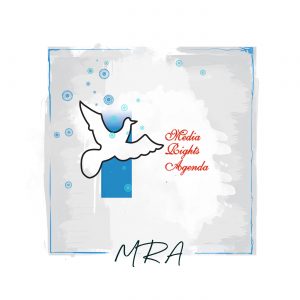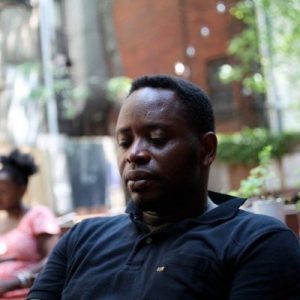13 Mar 19 | Awards, News and features
[vc_row][vc_column][vc_video link=”https://youtu.be/2DupMR8Kao8″][vc_column_text] Media Rights Agenda (MRA) is a non-profit organisation that has spent the last two decades working to improve media freedom and freedom of expression in Nigeria by challenging the government in courts.
Media Rights Agenda (MRA) is a non-profit organisation that has spent the last two decades working to improve media freedom and freedom of expression in Nigeria by challenging the government in courts.
While the 1999 Constitution of the Federal Republic of Nigeria guarantees the right to freedom of expression, other laws – including the sections of the Criminal Code, the Cybercrimes Act and the Official Secrets Act – limit and even criminalise expression.
Through its active legal team, MRA has initiated strategic litigation targeting dozens of institutions, politicians and officials with the aim of improving the country’s legal framework around media freedom. Its persistent campaigning and lawsuits around freedom of information have helped improve access to government-held data.
A notable example is MRA’s work on Nigeria’s Freedom of Information Act. The organisation campaigned for over a decade to ensure Nigeria adopted its own FOI Act, and even wrote a draft of the bill. Although an FOI act was finally passed, many states and institutions are not complying with the new law.
So far, the organisation has found 66 institutions and two judges that still fail to comply with the act – and has named, shamed and at times sued them. It continues to have many active court cases against government officials and institutions over over the application of the act.
MRA has since also provided pro bono legal services to journalists, including FOI litigation to implement the act, and FOI training to over 2,000 journalists and organisations.
MRA also draws attention to attacks on journalists and the media through its website.
MRA and its partners are also currently challenging the repressive provisions of Nigeria’s Cybercrimes Act, and the case is currently pending at the Nigerian Supreme Court. The Section 24 of the 2015 law has been used by the country’s politicians to accuse journalists of cyberstalking for the publication of critical articles.
At the continental level, MRA was among the organisations that campaigned against internet shutdowns in Africa. The campaign resulted in a resolution by the African Commission on Human and People’s Rights affirming the rights of all Africans to free expression online.
MRA was also one of the organisations that worked to develop the African Declaration on Internet Rights and Freedoms and the African Platform on Access to Information (APAI) Declaration. [/vc_column_text][vc_separator][vc_row_inner][vc_column_inner width=”1/2″][vc_single_image image=”104691″ img_size=”full” onclick=”custom_link” link=”https://www.indexoncensorship.org/2019/01/awards-2019/”][/vc_column_inner][vc_column_inner width=”1/2″][vc_column_text]
Index on Censorship’s Freedom of Expression Awards exist to celebrate individuals or groups who have had a significant impact fighting censorship anywhere in the world.[/vc_column_text][/vc_column_inner][/vc_row_inner][vc_separator][/vc_column][/vc_row][vc_row][vc_column][vc_basic_grid post_type=”post” max_items=”4″ element_width=”6″ grid_id=”vc_gid:1552057575584-da476382-369c-6″ taxonomies=”26925″][/vc_column][/vc_row]
12 Mar 19 | Awards, News and features
[vc_row][vc_column][vc_video link=”https://youtu.be/afHCcOfrBSY”][vc_column_text] The Institute for Media and Society (IMS) is a Nigerian NGO that is going to great lengths to improve the country’s media landscape by challenging government regulation and fostering the creation of community radio stations in rural areas at a time when local journalism globally is under threat.
The Institute for Media and Society (IMS) is a Nigerian NGO that is going to great lengths to improve the country’s media landscape by challenging government regulation and fostering the creation of community radio stations in rural areas at a time when local journalism globally is under threat.
IMS’s approach combines advocacy to repeal legal restrictions and practical action to encourage Nigerians to use their voices. IMS studies the legal framework in which Nigerian media operate, and pressures the government to act on their recommendations. It also uses its expertise to stimulate bottom-up changes in the national media landscape by encouraging Nigerians to develop their own media outlets.
IMS reports that 75% of television and radio stations in Nigeria are owned by politicians, and as a result they are divided along political lines, while rural communities are increasingly marginalised.
As the headquarters of the Nigerian Community Radio Coalition, IMS advocated for under reported communities to start their own radio stations, and in 2015, this led to the licensing of 17 community radio stations. Many of these outlets have since evolved into solid platforms that champion community development, transparency in governance and accountability.
In its advocacy work, IMS lobbies the government and the National Assembly to reform the country’s legal framework. In one of its latest battles, IMS has been advocating for the independence of the Nigerian Broadcasting Commission, the agency that regulates the country’s broadcast media, from ongoing governmental interference – a major impediment to freedom of expression.
Through its website, IMS also monitors Nigerian media and tracks violations of the rights of journalists. Their work draws attention to an increasingly hostile environment. The last few years have seen murders, arrests and threats against journalists.
One of IMS’s success stories in 2018 was its opposition of the ‘Nigerian Press Council Bill 2018’, which critics contended was not only draconian and unconstitutional, but would have also criminalised journalism practice. The bill was withdrawn from consideration by the National Assembly.
IMS also successfully lobbied the NBC for reducing community radio license fees from N500,000 to N200,000, and is advocating for their complete removal. [/vc_column_text][vc_separator][vc_row_inner][vc_column_inner width=”1/2″][vc_single_image image=”104691″ img_size=”full” onclick=”custom_link” link=”https://www.indexoncensorship.org/2019/01/awards-2019/”][/vc_column_inner][vc_column_inner width=”1/2″][vc_column_text]
Index on Censorship’s Freedom of Expression Awards exist to celebrate individuals or groups who have had a significant impact fighting censorship anywhere in the world.[/vc_column_text][/vc_column_inner][/vc_row_inner][vc_separator][/vc_column][/vc_row][vc_row][vc_column][vc_basic_grid post_type=”post” max_items=”4″ element_width=”6″ grid_id=”vc_gid:1552321469663-a73739a4-7337-9″ taxonomies=”26925″][/vc_column][/vc_row]
02 Aug 18 | Artistic Freedom, Event Reports, News and features
[vc_row][vc_column][vc_raw_html]JTNDaWZyYW1lJTIwc3JjJTNEJTIyaHR0cHMlM0ElMkYlMkZ3d3cuZmFjZWJvb2suY29tJTJGcGx1Z2lucyUyRnZpZGVvLnBocCUzRmhyZWYlM0RodHRwcyUyNTNBJTI1MkYlMjUyRnd3dy5mYWNlYm9vay5jb20lMjUyRmdheXRpbWVzJTI1MkZ2aWRlb3MlMjUyRjEwMTU2MjA2MDM5MDM2MjczJTI1MkYlMjZzaG93X3RleHQlM0QwJTI2d2lkdGglM0Q3MDAlMjIlMjB3aWR0aCUzRCUyMjcwMCUyMiUyMGhlaWdodCUzRCUyMjQwMCUyMiUyMHN0eWxlJTNEJTIyYm9yZGVyJTNBbm9uZSUzQm92ZXJmbG93JTNBaGlkZGVuJTIyJTIwc2Nyb2xsaW5nJTNEJTIybm8lMjIlMjBmcmFtZWJvcmRlciUzRCUyMjAlMjIlMjBhbGxvd1RyYW5zcGFyZW5jeSUzRCUyMnRydWUlMjIlMjBhbGxvd0Z1bGxTY3JlZW4lM0QlMjJ0cnVlJTIyJTNFJTNDJTJGaWZyYW1lJTNF[/vc_raw_html][vc_column_text]“When I started recording my music I made the decision that I would be out. But at the same time I was so conscious of using pronouns and not coming across as too gay or not coming across too assuming,” said MNEK, English singer, songwriter and record producer, speaking at the Sonos Store in London.
Expression Uncensored, which was hosted by Sonos, Index on Censorship and Gay Times Magazine, featured a panel — Julia Farrington, associate art producer at Index, MNEK, Sado Opera, a queer band, and Princess Julia, a DJ and music writer — that discussed queer music and censorship around the world.
Farrington defined the two main types of censorship that she believes exist — classic state-sponsored censorship imposed through laws and government, and self-censorship.
MNEK’s self-censoring in the beginning of his career was the result of societal pressures. While he said that his coming out was in general a positive experience, he also talked about growing up in a British-Nigerian household where the only thing you hear about homosexuality is that it is wrong. After coming out to his parents, MNEK said that while they support his career and the music he produces, they are sometimes still shocked because “it’s not something they’re used to but it’s all about them learning. There’s nothing wrong with learning something new.”
Living in London, Princess Julia said she had never faced state-sponsored censorship. Instead she faced self-censorship as a result of cultural pressures to look and be a certain way. As part of the Blitz Kids of the 1970s, she helped usher in an era of queer people being able to express themselves the way they wanted to.
She believes that “there’s always been avant garde scenes, underground scenes going on. In times of repression or rebellion even, these scenes tend to emerge. Obviously in Russia, that why there are pockets of creative people striving forth and trying to have an identity.”
Hailing from Russia, Sado Opera faced more state-sponsored censorship, which, in general, leads to self-censorship for fear of being targeted.
Sado Opera was originally created to fight the censorship and homophobia in Russia. The group talked about Russia’s homosexual propaganda law, which forbids talking about homosexuality in public. The name of the law was changed to Promoting Untraditional Family Values to hide the homophobia of the government. The government gives laws unassuming names to make it harder for people to discern the malicious intent behind the legislation, Sado Opera explained.
“Other artists might want to express support, but they can’t. The atmosphere makes you double-think what you say” said Sado Opera.
Although MNEK hasn’t experienced the level of state-sponsored censorship that Sado Opera has, he talks about how he hasn’t been to Nigeria in a long time because of unconscious “fears and my own insecurities with going back there and knowing the legislative issues that are there.”
Sado Opera was only able to be more open about their message when they moved to Berlin, where they have sponsorship from a club and have partnered with several organisations that support LGBTQ+ people facing persecution and women who have survived rape.
MNEK said “it’s a bonus when you realise your music is helping someone live their life” and each artist revealed similar sentiments. [/vc_column_text][vc_row_inner][vc_column_inner width=”1/4″][vc_column_text]
[/vc_column_text][/vc_column_inner][vc_column_inner width=”3/4″][vc_column_text]
Index encourages an environment in which artists and arts organisations can challenge the status quo, speak out on sensitive issues and tackle taboos.
Index currently runs workshops in the UK, publishes case studies about artistic censorship, and has produced guidance for artists on laws related to artistic freedom in England and Wales.
Learn more about our work defending artistic freedom.[/vc_column_text][/vc_column_inner][/vc_row_inner][vc_single_image image=”101971″ img_size=”full” add_caption=”yes”][vc_single_image image=”101969″ img_size=”full” add_caption=”yes”][/vc_column][/vc_row]
19 Oct 16 | Africa, mobile, News and features
 Nigerian writer Ken Saro-Wiwa Junior has died in London, aged 47, following a stroke.
Nigerian writer Ken Saro-Wiwa Junior has died in London, aged 47, following a stroke.
Saro-Wiwa Junior, a journalist and special adviser to three Nigerian presidents, was the son of environmental activist Ken Saro-Wiwa, who was hanged at the orders of Nigeria’s rulers in 1995.
Saro-Wiwa Junior last featured in Index on Censorship magazine in 2015, marking the 20th anniversary of the hanging by revisiting a letter his father sent him from prison.
From the Index on Censorship magazine archives, read in full: A letter from Ken Saro-Wiwa.
In it, Saro-Wiwa Junior wrote: “I am struck now as I was then at the way the letter is clearly written for public consumption as much as for my benefit. I bristled back then at the realisation that I was being served up as a piece of agitprop but now I can smile at the memory.
“I duly did my duty as instructed in the letter, getting the word out to the world’s media and defending my father right up to his execution and for some time after. In a way you could say it was the making of me as a man, a journalist and a writer – pretty much as he predicted in this letter.”
 Media Rights Agenda (MRA) is a non-profit organisation that has spent the last two decades working to improve media freedom and freedom of expression in Nigeria by challenging the government in courts.
Media Rights Agenda (MRA) is a non-profit organisation that has spent the last two decades working to improve media freedom and freedom of expression in Nigeria by challenging the government in courts.
 The Institute for Media and Society (IMS) is a Nigerian NGO that is going to great lengths to improve the country’s media landscape by challenging government regulation and fostering the creation of community radio stations in rural areas at a time when local journalism globally is under threat.
The Institute for Media and Society (IMS) is a Nigerian NGO that is going to great lengths to improve the country’s media landscape by challenging government regulation and fostering the creation of community radio stations in rural areas at a time when local journalism globally is under threat. Nigerian writer Ken Saro-Wiwa Junior has died in London, aged 47, following a stroke.
Nigerian writer Ken Saro-Wiwa Junior has died in London, aged 47, following a stroke.